Used Boom Crane Search Result
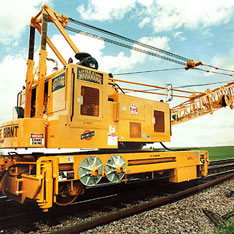
Railroad crane
In an accident, they may leave the tracks. The cranes can pick them up and put them back on the tracks. Railroad cranes can only lift things near the tracks. A railroad crane, (crane car or wrecker (US) or breakdown crane (UK)) is a type of crane Used on a railroad for one of three primary uses: freight handling in goods yards, permanent way (PW) maintenance, and accident recovery work. Although the design differs according to the type of work, the basic configuration is similar in all cases:
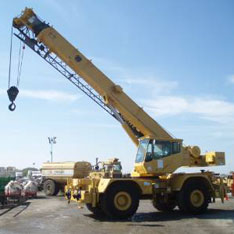
Rough terrain crane
Rough terrain crane is a crane mounted on an undercarriage with four rubber tires that is designed for pick-and-carry operations and for off-road and "rough terrain" applications. Outriggers are Used to level and stabilize the crane for hoisting. These telescopic cranes are single-engine machines, with the same engine powering the undercarriage and the crane, similar to a crawler crane. In a rough terrain crane, the engine is usually mounted
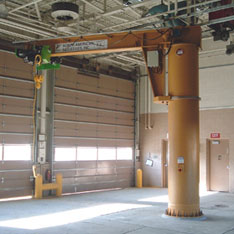
Jib crane
A jib Crane is a type of crane where a horizontal member (jib or boom), supporting a moveable hoist, is fixed to a wall or to a floor-mounted pillar, which is a style of cranes in case of which a horizontal portion called the boom or the jib supports a moveable
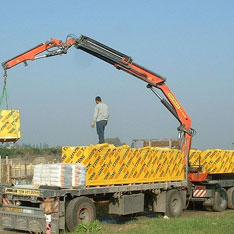
Loader crane
A loader crane (also called a knuckle-boom crane or articulating crane ) is a hydraulically-powered articulated arm fitted to a truck or trailer, and is Used for loading/unloading the vehicle. The numerous jointed sections can be folded into a small space when the crane is not in use. One or more of the sections may be telescopic. Often the crane will have a degree of automation and be able to unload
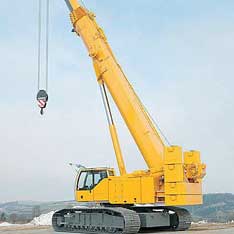
Telescopic crane
A telescopic crane has a boom that consists of a number of tubes fitted one inside the other. A hydraulic or other powered mechanism extends or retracts the tubes to increase or decrease the total length of the boom. These types of booms are often Used for short term construction projects, rescue jobs, lifting boats in and out of the water, etc. The relative compactness of telescopic booms make them adaptable for many mobile applications.
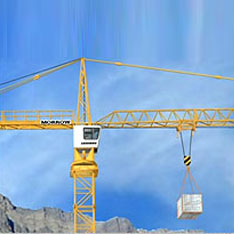
Tower Crane
A tower crane is Used to build very tall buildings. The crane be on the ground or on a floor in the building. As each floor is built, the crane is moved up. Tower cranes are one of the most important device that is used for the construction of huge buildings. They are
FAQ About Used Boom Crane
- Tower Crane Safety Devices
- Crane History
- Cranes,overhead traveling crane,Construction cranes,Tower cranes,Mobile cranes,Articulating cranes
- Gantry crane introduce
- PORTABLE TRUCK-MOUNTED CRANE BOOMS
- Guy Derrick
- Hydraulic Telescoping Gantries
- All-Terrain Carriers
- Tower-mounted crane
- Mobile Crane Clearances
- Mobile Crane Clearance In Tight Quarters
- MOBILE CRANES INTRODUCTION
- What Are Telescopic Cranes?
- Jib Cranes
- Oregon OSHA’s new crane standard for the construction industry
- Wall Mounted Jib Cranes
panel lights on, at the same time, load moment limiter stops crane operation. Winch Ratchet Locking Device Winch drum has a ratchet locking device, and it must be turned on when lowering boom, otherwise boom cannot be lowered. The device is Used to stow the boom for safety. Boom Angle Limit When boom angle is more than 800, load moment limiter and hoist limit switch stop boom raising. When boom angle is less than 300, hoist limit switch stops boom lowering. Audio/Video Warning When
that lift and move bulk materials, such as grain and coal, in a continuous process. The word crane is taken from the fact that these machines have a shape similar to that of the tall, long-necked bird of the same name. Human beings have Used a wide variety of devices to lift heavy objects since ancient times. One of the earliest versions of the crane to be developed was the shaduf, first used to move water in Egypt about four thousand years ago. The shaduf consists of a long, pivoting
Very few machines exist in as wide a variety of designs as cranes. Before the crane is constructed, the manufacturer must consider the site where it will be Used and the weight it will need to lift. In addition, cranes are often modified to suit the needs of the user. For these reasons, it is not much of an exaggeration to say that no two cranes are exactly alike. Cranes used for industrial purposes
Gantry crane is installed in the level of bridge constitute the two legs supporting the shape of a gantry-type crane bridge. This crane orbit on the ground, mainly Used in open yard storage, shipyards, power plants, ports and railway stations to carry out cargo handling and installation. Gantry cranes lifting bodies, car bodies and bridge operation structure, with essentially the same bridge crane. As a result
10-20 tons, at the most. The truck-mounted crane booms are removable from the truck beds on which they are mounted. There are two forms of this portable type of equip- ment. One is the articulated, short height knuckleboom, which is frequently Used to load material on and off the truck. They operate somewhat like the human arm with hydraulic controls to make the movements from the "shoulder" at the truck bed through the "elbow" to the "wrist" and "hand" at the load pick up end. This type of
Guy derricks at one time were the only practical means to erect steelwork on high-rise structures, but that work is mostly done now with tower cranes. Guy derricks may also be Used for general rigging, stone quarrying, and construction of refineries and chemical plants. A guy derrick can be described as a Chicago boom with its own integral column, called a mast, held vertical by six or more guy ropes, as shown in Figure
Telescophig gantries are typically Used for heavy lifting where mobile cranes or derricks are not feasible, where classic "jack and slide" procedures are awkward, or where other conditions make use of the gantry the most economical means to perform the work required. These systems first
First appearing in Europe during the late 1970s, the all-terrain crane now accounts for a majority of mobile-crane sales throughout the world. The carriers Used on these telescoping cantilevered-boom machines combine the high road speeds of truck carriers with some of the off-road capabilities of the rough-terrain crane. Large-capacity multiaxle models have appeared featuring the characteristics necessary
At least that is the broad picture; contractors in some localities cling longer to traditional practices than others. Tower cranes are the lifting machines of choice worldwide for most mid- and high-rise building construction. They are Used also on expansive sites where the broad hook sweep and the relative ease of coordinating multiple tower cranes is an advantage. There are niche markets for these as well; cable stay and suspension bridges, offshore oil platforms, and power
of a building, the underside of the boom or jib cannot clear it. The authors refer to this as a swing clearance problem. The hook cannot reach sufficient height to place the load. This is known as a drift deficiency. It is sometimes caUsed by an underestimation of the length slings or height of the rigging supporting the load. The aft end of the crane superstructure cannot clear an obstruction. The counterweights, for instance, interfere with a tree or a live mast fouls a
These limitations not only weigh on the operation but also need to be considered when the front-end attach ment is to be stowed during nonworking hours or the crane is to be secured in advance of a storm. Interference is sometimes caUsed by a secondary element that might easily be missed unless the planner takes a second look. A cab, slack cable, or transition piece might easily be overlooked. The clearance dimensions of projecting or overhanging components are usually given
capacity of models usually purchased for industrial use ranges from 5 to 30 tonnes. The radius of operation depends, of course, on the length of the boom. Auto-lift models with booms up to 18 m long are standard. Boom up to 30 m long are Used on special work. The group of trackless cranes is made up mainly of pillar cranes mounted on trucks, automobiles or tractors and intended for traveling on dirt, gravel and asphalt roads.
Telescopic cranes are another form of heavy cranes employed to transport and maneuver objects from one place to another. Cranes like the telescopic cranes are often Used in day-to-day hauling operations but it has also to be noted that these heavy cranes are very important when it comes to carrying out maneuvering operations in ports as well. Telescopic cranes are mobile in the sense that they transport goods
ones that can swing through an angle or arc are more useful since they can operate over larger areas as compared to the ones that remain stationary. Nowadays crane jibs have almost become an indispensible part of a worker’s life. They are Used to serve a multitude of purposes besides being utilized for a variety of applications in docks, ship yards, sites for building construction, ware houses, factories, etc. This multi-utility equipment comes in different types and is grouped
applies to all employers who are engaged in construction work and use cranes or derricks for construction. The standard takes effect Feb. 9, 2011. What equipment is covered? Oregon OSHA’s crane standard covers power-operated equipment Used in construction that can hoist, lower, and horizontally move a suspended load – including, but not limited to: Articulating knuckle-boom cranes Crawler cranes Derricks Mobile cranes Tower cranes The standard also applies to crane
components supplied by BossBuyer. All hardware for bolting the hinges to the jib crane is supplied. 301 Series Wall Mounted Jib Cranes - Tie Rod Supported 200° rotation. Wall bracket (tie rod supported boom). No supporting components are Used under boom enabling full utilization of work area. Utilizes standard I-beam and single tie rod design to eliminate off-center loading problems. Spans to 30 feet standard (longer spans available). This design is the most economical style of
Relative Searches
Used Boom Crane, Truck Mounted Crane, Truck Crane P H, Trolley Crane, Track Crane Rail, Used Boom Crane, Used Crane, Used Truck Crane, Van Crane, Vehicle Crane,

Email: sales@bossbuyer.com
Skype: bossbuyer
Market Hotline
0086-21-61435-919
Service Hotline:
0086-21-61435-919
